(考点特训)2025年中考英语一轮复习2:Modules 6~10课件(外研版七上英语)
文档属性
| 名称 | (考点特训)2025年中考英语一轮复习2:Modules 6~10课件(外研版七上英语) |
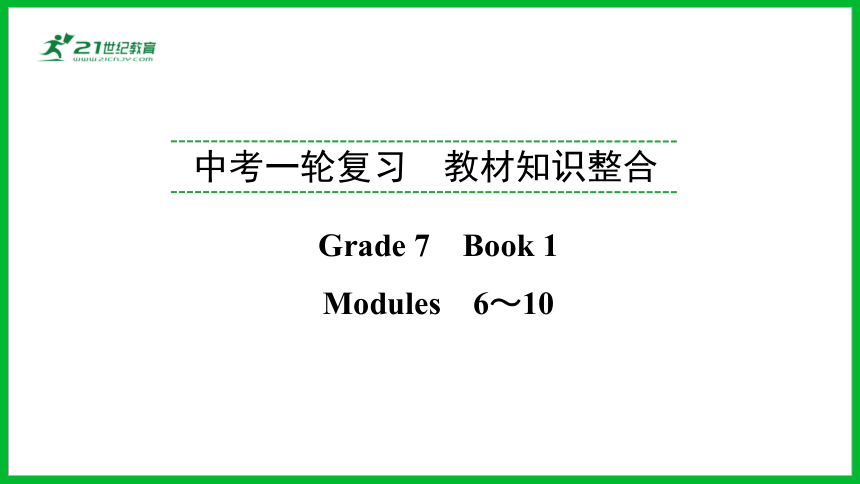
|
|
| 格式 | pptx | ||
| 文件大小 | 744.5KB | ||
| 资源类型 | 试卷 | ||
| 版本资源 | 外研版 | ||
| 科目 | 英语 | ||
| 更新时间 | 2025-05-12 22:57:08 | ||
图片预览

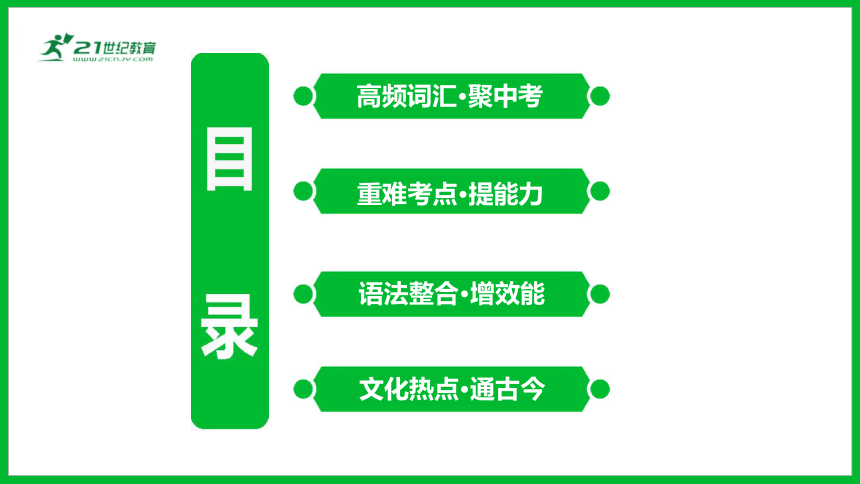




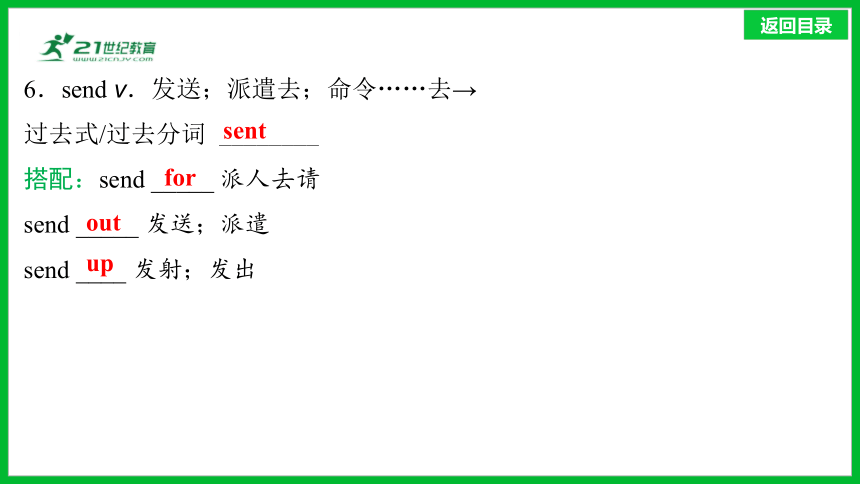
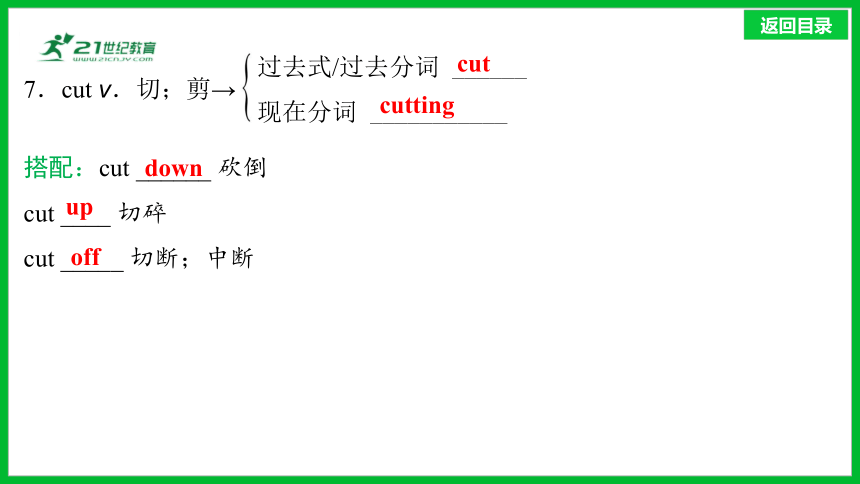
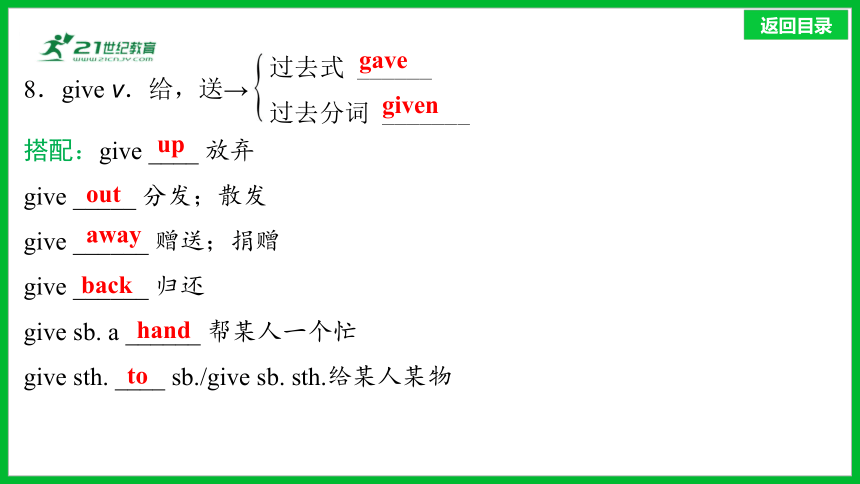
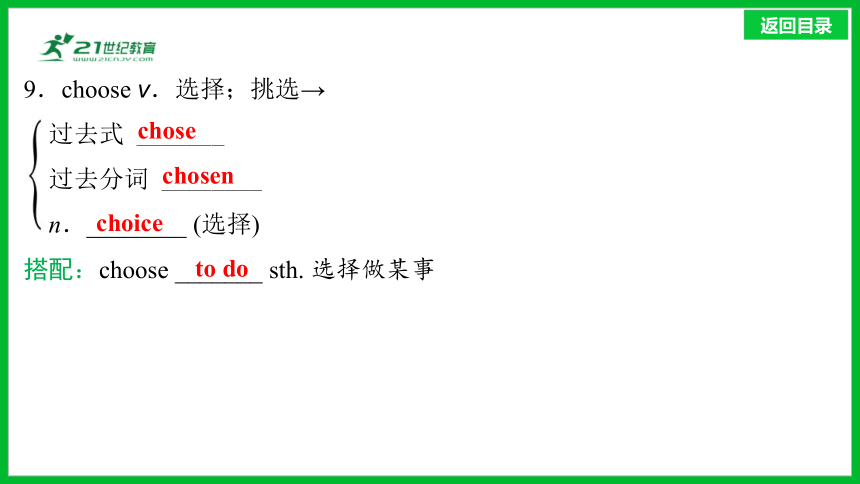


文档简介
(共60张PPT)
中考一轮复习 教材知识整合
Grade 7 Book 1
Modules 6~10
高频词汇·聚中考
重难考点·提能力
语法整合·增效能
核心实验·提素养
文化热点·通古今
高频词汇·聚中考
1.come v.来→
搭配:come _________ 提出;想出
come ____ 加油;来吧
come _____ 出现;出版
过去式 ______
过去分词 ______
came
come
up with
on
out
2.different adj.不同的→
反义词 ______
adv._____________ (不同地)
搭配:be different ______ 与……不同;与……有差异
3.catch v.抓住;接住→过去式/过去分词 ________
搭配:catch _________ 赶上
same
differently
from
caught
up with
4.learn v.学;学习
过去式/过去分词 _________________
搭配:learn _______ sth.学习做某事
learn ______ 向……学习
learn _______ 了解;获悉
learned/learnt
to do
from
about
5.plan n.计划 v.计划;打算
过去式/过去分词 _________
现在分词 __________
搭配:plan _______ sth.计划做某事
plan _____ sth.为某事制订计划
make plans/a plan _______ sth.计划做某事
make plans/a plan _____ sth.为某事制订计划
planned
planning
to do
for
to do
for
6.send v.发送;派遣去;命令……去→
过去式/过去分词 ________
搭配:send _____ 派人去请
send _____ 发送;派遣
send ____ 发射;发出
sent
for
out
up
7.cut v.切;剪→
搭配:cut ______ 砍倒
cut ____ 切碎
cut _____ 切断;中断
过去式/过去分词 ______
现在分词 ___________
cut
cutting
down
up
off
8.give v.给,送→
搭配:give ____ 放弃
give _____ 分发;散发
give ______ 赠送;捐赠
give ______ 归还
give sb. a ______ 帮某人一个忙
give sth. ____ sb./give sb. sth.给某人某物
过去式 ______
过去分词 _______
gave
given
up
out
away
back
hand
to
9.choose v.选择;挑选→
过去式 _______
过去分词 ________
n.________ (选择)
搭配:choose _______ sth. 选择做某事
chose
chosen
choice
to do
10.exercise n.锻炼;练习 v.运动;锻炼
搭配:__________ exercise 锻炼
____________ exercises 做早操
do+学科+exercises 做……(学科)练习题
11.afraid adj.担心的;害怕的
搭配:be afraid _______ sth.害怕/不敢做某事
be afraid ____ (doing) sth.害怕/担心(做)某事(出现某种不良后果)
句型:I'm afraid so/not. 恐怕是这样/恐怕不行。
take/do
do morning
to do
of
12.call v.(给……)打电话
搭配:call sb. ______ 给(某人)回电话
call sb. ____ +电话号码 拨打……(电话号码)找某人
13.wait v.等待,等候
n.________ (男服务员)
n.__________ (女服务员)
搭配:wait _____ 等候
can't wait _______ sth. 迫不及待地想做某事
back
at
waiter
waitress
for
to do
14.enjoy v.享受……的乐趣;喜爱→
adj.___________ (有乐趣的;令人愉快的)
搭配:enjoy _______ sth.喜欢做某事
enjoy _________ 玩得高兴
15.leave v.离开;丢下;遗忘【2024.42】→过去式/过去分词 _______
搭配:leave someplace 离开某地
leave _____ someplace 启程去某地
leave _____ 忽略;不提及
enjoyable
doing
oneself
left
for
out
16.run v.跑,奔跑
过去式 ______
过去分词 ______
现在分词 __________
n.________ (跑步者)
搭配:run ______ 跑开
run __________ 耗尽
run _______ 追逐
ran
run
running
runner
away
out (of )
after
17.sweep v. 扫;打扫→过去式/过去分词 _______
搭配: sweep the _______ 打扫地板
sweep ______ 清除;一扫而空
18.mean v.意思是;意味着→
过去式/过去分词 ________
n._________ (意思;意义)
adj.____________ (有意义的)
adj._____________ (无意义的)
搭配:mean _______ sth.意味着做某事
mean _______ sth.打算做某事
swept
floor
away
meant
meaning
meaningful
meaningless
doing
to do
19.think v.想,以为→过去式/过去分词 _________
搭配:think ____ 考虑;想起
think _______ 考虑
think ______ 仔细考虑
thought
of
about
over
1.guide
A.n.导游
B.n.指南;手册
C.v.给某人引路;指引;指导
( )(1)Let's have a look at the TV guide and see what's on.
( )(2)Our teacher guided us through the busy streets to the bookstore.
( )(3)Please keep silent when we listen to the tour guide in the museum.
熟词生义
B
C
A
2.catch
A.v.抓住;接住
B.v.赶上(公共汽车、火车、飞机等)
C.v.得病;染疾
( )(1)Pandas can also eat meat and sometimes they catch small birds.
( )(2)Tony was unlucky to catch a cold on the first day of the winter vacation.
( )(3)George always gets up early in the morning in order to catch the school bus.
A
C
B
3. save
A.v.保存;储存 B.v.救;救助;挽救
C.v.储蓄;攒钱 D.v.节省(能源)
( )(1)John is saving his strength for the last part of the race.
( )(2)The young man saved a little girl from falling into the water.
( )(3)We should do something to save energy whether at home, at work or at school.
( )(4)I want to save some money to buy some school things for the children in poor areas.
A
B
D
C
4.party
A.n.晚会;聚会 B.n.一方
( )(1)Discussing a matter with a third party can often be helpful.【2024阅读理解D篇】
( )(2)Ricky's birthday is coming, and I'm planning a surprise party for him.
B
A
5.plant
A.n.植物 B.v.种植
( )(1)The plant may grow to a height of several metres, and it depends on land condition.
( )(2)People often plant plenty of trees to prevent the soil being washed away and protect the environment.
A
B
词汇攻关
单项填空
1.-What's your ________ for this weekend, Sarah
-I'm going to visit the sick kids in hospital to cheer them up this Sunday.
A.plan B.dream
C.hope D.task
A
2.The two bags are ________ in price. The black one is much cheaper.
A.direct B.special
C.secret D.different
3.-I have a poor sense of direction, so I'm afraid ________ going out alone.
-Don't worry. A lot of apps can help you.
A.out B.of
C.over D.to
D
B
4.-What do you ________ this toy
-I don't like it. Please show me another one.
A.pick out B.think of
C.come over D.care for
B
单词拼写
5.On Sunday morning, my sister did the washing and I s______ (扫) the floor.
6.The little white cat looks so lovely that the child can't w_____ (等待) to keep it.
7.Many tourists l_____ (离开) for Harbin to see the Ice and Snow World last winter.
wept
ait
eft
8.Tina is busy with work at school,but she never forgets to c_____ (打电话) her mother every day.
9.Students in Anhui have e________ (享受) all kinds of free after school services in the past three years.
all
njoyed
重难考点·提能力
考点1
take的用法
【教材例句】 Wang Hui is taking lots of photos. 王慧正在拍很多照片。
【七上Module 9 P54】
拓展
常见take短语小结:
take up占据;开始从事
take place发生;出现
take off脱下;(飞机)起飞
take away拿走;带走
take part in参加
take care of 照顾
考点2
辨析also、too、either与as well
【教材例句】 But they also eat plants.但它们也吃植物。
【七(上)Module 6 P36】
also、too、either与as well均意为“也”,具体用法及区别如下:
e.g. I'm looking forward to the exchange, too!我也很期待这次交流!
【2024 完形填空A篇】
Tom can't go to the cinema and I can't either.汤姆不能去电影院,我也不能。
To learn kung fu well, they must have a strong will and learn respect as well/too.要学好功夫,他们必须有坚强的意志,并且也要学会尊重。
【2024 阅读理解C篇】
考点3
常见频度副词辨析(always、usually、often、sometimes、seldom 与 never)
【教材例句】 I always like birthday parties.我总是喜欢生日聚会。
【七(上)Module 8 P48】
频度副词是表示频率的一类副词,一般用在实义动词之前,be动词、助动词或情态动词之后,其频率大小如下图:
(1)always “总是;永远”,语气最强,指在一切时候,没有例外;
(2)usually “通常;习惯于”,很少有例外,通常指习惯性动作;
(3)often “往往;经常”,不如usually频繁,侧重动作发生的经常性;
(4)sometimes “有时”,表示动作偶尔发生;
(5)seldom “很少”,表示否定意义,几乎不会发生;
(6)never “从不”,其频率为零。
考点4
辨析 wear、(be) in、dress与put on【2024.35】
【教材例句】 They sometimes wear T shirts.他们有时穿T恤。
【七(上)Module 8 P50】
考 点 用 法 wear wear +衣服/首饰等,表示“穿着/戴着……” 表状态
(be) in be in+颜色/衣服,表示“穿着……” dress be dressed in+衣服,表示“穿着……” 考 点 用 法 dress dress up打扮;穿上盛装 get dressed 装扮;乔装打扮 dress+sb./oneself 给某人/自己穿衣服 表动作
put on put on+衣服,表示“穿上……”
一言辨异
The little girl put on her coat and went out.She was a beautiful girl in a red hat today. She also wore a red scarf. Her mother was very glad that she could dress herself.那个小女孩穿上外套出去了。她今天是戴着红色帽子的漂亮女生。她还围了一条红色的围巾。她妈妈很开心她能自己穿衣服了。
考点5
辨析happen与take place
【教材例句】 What's happening 怎么啦? 【七(上)Module 10 P60】
考 点 用 法 共同点
happen (1)指偶然地、没有预料地“发生” (2)sth. happen+地点/时间,意为“某地/某时发生了某事” (3)happen to do sth.意为“碰巧做某事” (4)sth. happen to sb./sth.意为“某人/某物发生某事情” (1)二者均有“发生”之意,都是不及物动词(词组),都不能用于被动语态;
(2)二者都是非延续性(瞬间) 动词(词组),都不能与表示时间段的时间状语连用
take place 指必然性地发生或有计划、有组织地在安排之内“举行” e.g. We happened to discover we had a friend in common.我们碰巧发现我们有一个共同的朋友。
Great changes have taken place in towns that we have lived in for decades.我们居住了数十年的城镇发生了巨变。
活学巧练
单项填空
1.The doctor asked Jack to ________ the medicine twice a day so that he could get better soon.
A.drink B.cut
C.take D.make
C
2.-I saw a traffic accident on my way home.
-That's too bad.I hope such things will never ________ again.
A.start B.develop
C.happen D.shake
3.-Each student who gave opinions in the meeting was given a blind box.
-That's cool! I wish I could have one, ________.
A.either B.neither
C.also D.too
C
D
4.Tom is such an excellent student that he ________ stays at the top of his class.
A.always B.never
C.hardly D.sometimes
5.-Did you notice the woman ________ red
-Yes. She is my new English teacher.
A.on B.at
C.for D.in
A
D
6.-Mr. Brown, how can we keep safe when we ride a bike on the road
-Slow down and remember to __________ your helmets.
A.take off B.put on
C.move away D.get out
7.-Where does the conversation ________?
-At a supermarket.
A.break out B.take place
C.happen to D.leave for
B
B
单词拼写
8.The earth travels around the sun, and other planets a_____ (也) travel around the sun.
9.We s_______ (很少) go out to eat because we believe home cooking is healthier.
10.There's h_______ (几乎不) any time for us to catch a bus.
11.Drivers must w_____ (系) seat belts while their cars are running on the road.
12.In the movie, Mulan d________(穿衣服) herself like a boy and takes her father's place to fight in the army.
lso
eldom
ardly
ear
resses
语法整合·增效能
谓语动词的时态Ⅰ
考点1
一般现在时
基本结构及时间标志词 结 构 (1)主语+am/is/are+其他
(2)主语+动词原形/动词单三形式+其他
标 志 词 (1)频度副词:always、usually、often、sometimes、seldom、never、hardly
(2)频率词组:once a year、twice a month、three times a day等
(3)其他词组:on Sundays、at weekends、every day/year…(every系列)
常见用法及例句
(1)表示现在所处的状态或现阶段经常性、习惯性的动作,常与频度副词
连用。
(2)表示客观真理、客观存在或自然现象。
注意:表示客观事实的句子作宾语从句时,可以不受主句时态的影响始终用一般现在时。e.g.
The teacher told us that the earth goes around the sun. 老师告诉我们地球绕着太阳转。
goes不必变成went
常见用法及例句
(3)用在以if、unless、as soon as、when、once等引导的时间或条件状语从句中,用一般现在时表示将来。e.g.
What will you do if you visit an old people's home?如果你去敬老院,你会做什么?
When I get to senior high, I will join the school swim team.当我上高中后,我将加入学校的游泳队。
(4)表示按计划或安排好的将要发生的动作,用一般现在时表将来,但仅限于start、begin、leave、go、come、arrive等词。e.g.
The train leaves at six tomorrow morning. 这列火车将在明天早上六点离开。
考点2
一般过去时
基本结构及时间标志词 结 构 (1)主语+was/were+其他
(2)主语+动词过去式(+其他)
标 志 词 (1)ago词组
(2)yesterday及yesterday词组
(3)last词组
(4)just now、in the past、in 1920等
(5)at the age of…、used to…
(6)one day、long long ago、once upon a time
常见用法及例句
(1)表示过去某个时间里所发生的动作或存在的状态。e.g.
We went to the City Library last week.上周我们去了城市图书馆。
(2)表示过去常常或反复发生的动作,常与频度副词连用。e.g.
He always took the time to explain things to me clearly whenever I couldn't understand anything.每当我有什么不懂的时候,他总是花时间给我解释清楚。
(3)表示过去某个特定时间内一次完成的具有先后顺序的几个动作。e.g.
The boy opened his eyes, looked at the window, and then cried. 那个男孩睁开眼睛,看着窗户,然后哭了起来。
考点3
现在进行时
基本结构及时间标志词 结构 主语+am/is/are+动词现在分词
标志词 (1)now、right now
(2)at present、at this time、at the/this moment
(3)these days
(4)look、listen
常见用法及例句
(1)表示此时此刻正在进行的动作。e.g.
-What are you doing?你正在做什么?
-I am reading English books.我正在读英语书。
(2)表示现阶段正在进行的动作或持续的状态。e.g.
They are studying hard this term.他们这学期在努力学习。
(3)go、leave、arrive、start等位移性动词用现在进行时表示将来。e.g.
I am leaving next week.我下周要离开。
1.Every Sunday morning, I _________ a jog around a park near my home.
A.take B.took
C.will take D.has taken
语法闯关
A
2.-Have you watched the film YOLO
-Yes, it touched me a lot. I ________ it with my family two months ago.
A.watch B.will watch
C.watched D.have watched
3.Mr. Smith ________ an interesting talk on his visit to China at the meeting last night.
A.gives B.gave
C.will give D.has given
C
B
4.My mom ________ zongzi for us every Dragon Boat Festival. I like zongzi with red beans.
A.made B.makes
C.will make D.has made
5.-Here comes the bus!Where is Mr.Wu
-He can't go to the theatre with us. He ________ some students around our school.
A.show B.was showing
C.shows D.is showing
B
D
6.After hearing the questions,Mr. Li stopped writing and ________ to the students carefully.
A.replied B.will reply
C.replies D.reply
7.-Hello!Is that Emily speaking
-Sorry, this is Jack. My mother ________ in the kitchen.
A.cooks B.cooked
C.is cooking D.cooks
A
C
单词拼写
8.Bruce always b________(刷) his teeth after dinner.
9.Look!Some of our classmates are r________ (跑步) on the playground.
10.Last weekend, my parents and I h_______ (帮助) my grandparents with gardening.
11.City Walk,a new type of travelling,actually s________(开始) in Shanghai a long time ago.
rushes
unning
elped
tarted
文化热点·通古今
ost Chinese people like drinking tea. In fact,tea is the second most
1 drink after water. There are many kinds of tea in China like black tea, green tea, white tea and oolong tea.
M
话题:茶文化 体裁:说明文 词数:约220 难度:★★★ 建议用时:6分钟 实际用时: 正确率:
( ) 1. A. delicious B.popular C.healthy D.special
精准检测
B
Chinese people use tea in both medicine and food. Some people say that they can't live for three days 2 they don't drink tea. So we can know how 3
tea is in China.
( ) 2. A. if B.so C.until D.although
( ) 3. A. delicious B.interesting C.healthy D.important
精准检测
A
D
There are many teahouses in China. Drinking tea and serving tea are arts. Whenever guests visit, it is necessary to 4 tea for them. Tea ceremony is a kind of traditional 5 in China. And now more and more Chinese people 6 tea ceremony to keep healthy. And many people from other countries also like it very much. A cup of tea is almost a(n) 7 of Chinese culture.
( ) 4. A. use B.drink C.make D.enjoy
( ) 5. A. art B.method C.knowledge D.tool
( ) 6. A. write down B.learn about C.hear from D.talk with
( ) 7. A. answer B.symbol C.wish D.way
精准检测
C
A
B
B
The tea- drinking habit in the UK is 8 from that in China. British people have afternoon tea between lunch and dinner. It is the 9 meal after breakfast and lunch in a day. Most English people like to put 10 into tea. Some may put honey, or even cream into tea. But most Chinese people only like to drink tea with nothing in it.
No matter how people enjoy their tea,tea is really part of their life.
( ) 8. A. difficult B.same C.easy D.different
( ) 9. A. first B.second C.third D.last
( ) 10. A. milk B.water C.cola D.orange
精准检测
D
C
A
单词:teahouse n.茶馆;茶室 ceremony n.仪式;典礼
短语:many kinds of 许多种类的 keep healthy保持健康
句式:No matter how people enjoy their tea, tea is really part of their life. 不管人们如何享用茶,茶确实是他们生活的一部分。【适用话题:事物介绍】
积累卡
中考一轮复习 教材知识整合
Grade 7 Book 1
Modules 6~10
高频词汇·聚中考
重难考点·提能力
语法整合·增效能
核心实验·提素养
文化热点·通古今
高频词汇·聚中考
1.come v.来→
搭配:come _________ 提出;想出
come ____ 加油;来吧
come _____ 出现;出版
过去式 ______
过去分词 ______
came
come
up with
on
out
2.different adj.不同的→
反义词 ______
adv._____________ (不同地)
搭配:be different ______ 与……不同;与……有差异
3.catch v.抓住;接住→过去式/过去分词 ________
搭配:catch _________ 赶上
same
differently
from
caught
up with
4.learn v.学;学习
过去式/过去分词 _________________
搭配:learn _______ sth.学习做某事
learn ______ 向……学习
learn _______ 了解;获悉
learned/learnt
to do
from
about
5.plan n.计划 v.计划;打算
过去式/过去分词 _________
现在分词 __________
搭配:plan _______ sth.计划做某事
plan _____ sth.为某事制订计划
make plans/a plan _______ sth.计划做某事
make plans/a plan _____ sth.为某事制订计划
planned
planning
to do
for
to do
for
6.send v.发送;派遣去;命令……去→
过去式/过去分词 ________
搭配:send _____ 派人去请
send _____ 发送;派遣
send ____ 发射;发出
sent
for
out
up
7.cut v.切;剪→
搭配:cut ______ 砍倒
cut ____ 切碎
cut _____ 切断;中断
过去式/过去分词 ______
现在分词 ___________
cut
cutting
down
up
off
8.give v.给,送→
搭配:give ____ 放弃
give _____ 分发;散发
give ______ 赠送;捐赠
give ______ 归还
give sb. a ______ 帮某人一个忙
give sth. ____ sb./give sb. sth.给某人某物
过去式 ______
过去分词 _______
gave
given
up
out
away
back
hand
to
9.choose v.选择;挑选→
过去式 _______
过去分词 ________
n.________ (选择)
搭配:choose _______ sth. 选择做某事
chose
chosen
choice
to do
10.exercise n.锻炼;练习 v.运动;锻炼
搭配:__________ exercise 锻炼
____________ exercises 做早操
do+学科+exercises 做……(学科)练习题
11.afraid adj.担心的;害怕的
搭配:be afraid _______ sth.害怕/不敢做某事
be afraid ____ (doing) sth.害怕/担心(做)某事(出现某种不良后果)
句型:I'm afraid so/not. 恐怕是这样/恐怕不行。
take/do
do morning
to do
of
12.call v.(给……)打电话
搭配:call sb. ______ 给(某人)回电话
call sb. ____ +电话号码 拨打……(电话号码)找某人
13.wait v.等待,等候
n.________ (男服务员)
n.__________ (女服务员)
搭配:wait _____ 等候
can't wait _______ sth. 迫不及待地想做某事
back
at
waiter
waitress
for
to do
14.enjoy v.享受……的乐趣;喜爱→
adj.___________ (有乐趣的;令人愉快的)
搭配:enjoy _______ sth.喜欢做某事
enjoy _________ 玩得高兴
15.leave v.离开;丢下;遗忘【2024.42】→过去式/过去分词 _______
搭配:leave someplace 离开某地
leave _____ someplace 启程去某地
leave _____ 忽略;不提及
enjoyable
doing
oneself
left
for
out
16.run v.跑,奔跑
过去式 ______
过去分词 ______
现在分词 __________
n.________ (跑步者)
搭配:run ______ 跑开
run __________ 耗尽
run _______ 追逐
ran
run
running
runner
away
out (of )
after
17.sweep v. 扫;打扫→过去式/过去分词 _______
搭配: sweep the _______ 打扫地板
sweep ______ 清除;一扫而空
18.mean v.意思是;意味着→
过去式/过去分词 ________
n._________ (意思;意义)
adj.____________ (有意义的)
adj._____________ (无意义的)
搭配:mean _______ sth.意味着做某事
mean _______ sth.打算做某事
swept
floor
away
meant
meaning
meaningful
meaningless
doing
to do
19.think v.想,以为→过去式/过去分词 _________
搭配:think ____ 考虑;想起
think _______ 考虑
think ______ 仔细考虑
thought
of
about
over
1.guide
A.n.导游
B.n.指南;手册
C.v.给某人引路;指引;指导
( )(1)Let's have a look at the TV guide and see what's on.
( )(2)Our teacher guided us through the busy streets to the bookstore.
( )(3)Please keep silent when we listen to the tour guide in the museum.
熟词生义
B
C
A
2.catch
A.v.抓住;接住
B.v.赶上(公共汽车、火车、飞机等)
C.v.得病;染疾
( )(1)Pandas can also eat meat and sometimes they catch small birds.
( )(2)Tony was unlucky to catch a cold on the first day of the winter vacation.
( )(3)George always gets up early in the morning in order to catch the school bus.
A
C
B
3. save
A.v.保存;储存 B.v.救;救助;挽救
C.v.储蓄;攒钱 D.v.节省(能源)
( )(1)John is saving his strength for the last part of the race.
( )(2)The young man saved a little girl from falling into the water.
( )(3)We should do something to save energy whether at home, at work or at school.
( )(4)I want to save some money to buy some school things for the children in poor areas.
A
B
D
C
4.party
A.n.晚会;聚会 B.n.一方
( )(1)Discussing a matter with a third party can often be helpful.【2024阅读理解D篇】
( )(2)Ricky's birthday is coming, and I'm planning a surprise party for him.
B
A
5.plant
A.n.植物 B.v.种植
( )(1)The plant may grow to a height of several metres, and it depends on land condition.
( )(2)People often plant plenty of trees to prevent the soil being washed away and protect the environment.
A
B
词汇攻关
单项填空
1.-What's your ________ for this weekend, Sarah
-I'm going to visit the sick kids in hospital to cheer them up this Sunday.
A.plan B.dream
C.hope D.task
A
2.The two bags are ________ in price. The black one is much cheaper.
A.direct B.special
C.secret D.different
3.-I have a poor sense of direction, so I'm afraid ________ going out alone.
-Don't worry. A lot of apps can help you.
A.out B.of
C.over D.to
D
B
4.-What do you ________ this toy
-I don't like it. Please show me another one.
A.pick out B.think of
C.come over D.care for
B
单词拼写
5.On Sunday morning, my sister did the washing and I s______ (扫) the floor.
6.The little white cat looks so lovely that the child can't w_____ (等待) to keep it.
7.Many tourists l_____ (离开) for Harbin to see the Ice and Snow World last winter.
wept
ait
eft
8.Tina is busy with work at school,but she never forgets to c_____ (打电话) her mother every day.
9.Students in Anhui have e________ (享受) all kinds of free after school services in the past three years.
all
njoyed
重难考点·提能力
考点1
take的用法
【教材例句】 Wang Hui is taking lots of photos. 王慧正在拍很多照片。
【七上Module 9 P54】
拓展
常见take短语小结:
take up占据;开始从事
take place发生;出现
take off脱下;(飞机)起飞
take away拿走;带走
take part in参加
take care of 照顾
考点2
辨析also、too、either与as well
【教材例句】 But they also eat plants.但它们也吃植物。
【七(上)Module 6 P36】
also、too、either与as well均意为“也”,具体用法及区别如下:
e.g. I'm looking forward to the exchange, too!我也很期待这次交流!
【2024 完形填空A篇】
Tom can't go to the cinema and I can't either.汤姆不能去电影院,我也不能。
To learn kung fu well, they must have a strong will and learn respect as well/too.要学好功夫,他们必须有坚强的意志,并且也要学会尊重。
【2024 阅读理解C篇】
考点3
常见频度副词辨析(always、usually、often、sometimes、seldom 与 never)
【教材例句】 I always like birthday parties.我总是喜欢生日聚会。
【七(上)Module 8 P48】
频度副词是表示频率的一类副词,一般用在实义动词之前,be动词、助动词或情态动词之后,其频率大小如下图:
(1)always “总是;永远”,语气最强,指在一切时候,没有例外;
(2)usually “通常;习惯于”,很少有例外,通常指习惯性动作;
(3)often “往往;经常”,不如usually频繁,侧重动作发生的经常性;
(4)sometimes “有时”,表示动作偶尔发生;
(5)seldom “很少”,表示否定意义,几乎不会发生;
(6)never “从不”,其频率为零。
考点4
辨析 wear、(be) in、dress与put on【2024.35】
【教材例句】 They sometimes wear T shirts.他们有时穿T恤。
【七(上)Module 8 P50】
考 点 用 法 wear wear +衣服/首饰等,表示“穿着/戴着……” 表状态
(be) in be in+颜色/衣服,表示“穿着……” dress be dressed in+衣服,表示“穿着……” 考 点 用 法 dress dress up打扮;穿上盛装 get dressed 装扮;乔装打扮 dress+sb./oneself 给某人/自己穿衣服 表动作
put on put on+衣服,表示“穿上……”
一言辨异
The little girl put on her coat and went out.She was a beautiful girl in a red hat today. She also wore a red scarf. Her mother was very glad that she could dress herself.那个小女孩穿上外套出去了。她今天是戴着红色帽子的漂亮女生。她还围了一条红色的围巾。她妈妈很开心她能自己穿衣服了。
考点5
辨析happen与take place
【教材例句】 What's happening 怎么啦? 【七(上)Module 10 P60】
考 点 用 法 共同点
happen (1)指偶然地、没有预料地“发生” (2)sth. happen+地点/时间,意为“某地/某时发生了某事” (3)happen to do sth.意为“碰巧做某事” (4)sth. happen to sb./sth.意为“某人/某物发生某事情” (1)二者均有“发生”之意,都是不及物动词(词组),都不能用于被动语态;
(2)二者都是非延续性(瞬间) 动词(词组),都不能与表示时间段的时间状语连用
take place 指必然性地发生或有计划、有组织地在安排之内“举行” e.g. We happened to discover we had a friend in common.我们碰巧发现我们有一个共同的朋友。
Great changes have taken place in towns that we have lived in for decades.我们居住了数十年的城镇发生了巨变。
活学巧练
单项填空
1.The doctor asked Jack to ________ the medicine twice a day so that he could get better soon.
A.drink B.cut
C.take D.make
C
2.-I saw a traffic accident on my way home.
-That's too bad.I hope such things will never ________ again.
A.start B.develop
C.happen D.shake
3.-Each student who gave opinions in the meeting was given a blind box.
-That's cool! I wish I could have one, ________.
A.either B.neither
C.also D.too
C
D
4.Tom is such an excellent student that he ________ stays at the top of his class.
A.always B.never
C.hardly D.sometimes
5.-Did you notice the woman ________ red
-Yes. She is my new English teacher.
A.on B.at
C.for D.in
A
D
6.-Mr. Brown, how can we keep safe when we ride a bike on the road
-Slow down and remember to __________ your helmets.
A.take off B.put on
C.move away D.get out
7.-Where does the conversation ________?
-At a supermarket.
A.break out B.take place
C.happen to D.leave for
B
B
单词拼写
8.The earth travels around the sun, and other planets a_____ (也) travel around the sun.
9.We s_______ (很少) go out to eat because we believe home cooking is healthier.
10.There's h_______ (几乎不) any time for us to catch a bus.
11.Drivers must w_____ (系) seat belts while their cars are running on the road.
12.In the movie, Mulan d________(穿衣服) herself like a boy and takes her father's place to fight in the army.
lso
eldom
ardly
ear
resses
语法整合·增效能
谓语动词的时态Ⅰ
考点1
一般现在时
基本结构及时间标志词 结 构 (1)主语+am/is/are+其他
(2)主语+动词原形/动词单三形式+其他
标 志 词 (1)频度副词:always、usually、often、sometimes、seldom、never、hardly
(2)频率词组:once a year、twice a month、three times a day等
(3)其他词组:on Sundays、at weekends、every day/year…(every系列)
常见用法及例句
(1)表示现在所处的状态或现阶段经常性、习惯性的动作,常与频度副词
连用。
(2)表示客观真理、客观存在或自然现象。
注意:表示客观事实的句子作宾语从句时,可以不受主句时态的影响始终用一般现在时。e.g.
The teacher told us that the earth goes around the sun. 老师告诉我们地球绕着太阳转。
goes不必变成went
常见用法及例句
(3)用在以if、unless、as soon as、when、once等引导的时间或条件状语从句中,用一般现在时表示将来。e.g.
What will you do if you visit an old people's home?如果你去敬老院,你会做什么?
When I get to senior high, I will join the school swim team.当我上高中后,我将加入学校的游泳队。
(4)表示按计划或安排好的将要发生的动作,用一般现在时表将来,但仅限于start、begin、leave、go、come、arrive等词。e.g.
The train leaves at six tomorrow morning. 这列火车将在明天早上六点离开。
考点2
一般过去时
基本结构及时间标志词 结 构 (1)主语+was/were+其他
(2)主语+动词过去式(+其他)
标 志 词 (1)ago词组
(2)yesterday及yesterday词组
(3)last词组
(4)just now、in the past、in 1920等
(5)at the age of…、used to…
(6)one day、long long ago、once upon a time
常见用法及例句
(1)表示过去某个时间里所发生的动作或存在的状态。e.g.
We went to the City Library last week.上周我们去了城市图书馆。
(2)表示过去常常或反复发生的动作,常与频度副词连用。e.g.
He always took the time to explain things to me clearly whenever I couldn't understand anything.每当我有什么不懂的时候,他总是花时间给我解释清楚。
(3)表示过去某个特定时间内一次完成的具有先后顺序的几个动作。e.g.
The boy opened his eyes, looked at the window, and then cried. 那个男孩睁开眼睛,看着窗户,然后哭了起来。
考点3
现在进行时
基本结构及时间标志词 结构 主语+am/is/are+动词现在分词
标志词 (1)now、right now
(2)at present、at this time、at the/this moment
(3)these days
(4)look、listen
常见用法及例句
(1)表示此时此刻正在进行的动作。e.g.
-What are you doing?你正在做什么?
-I am reading English books.我正在读英语书。
(2)表示现阶段正在进行的动作或持续的状态。e.g.
They are studying hard this term.他们这学期在努力学习。
(3)go、leave、arrive、start等位移性动词用现在进行时表示将来。e.g.
I am leaving next week.我下周要离开。
1.Every Sunday morning, I _________ a jog around a park near my home.
A.take B.took
C.will take D.has taken
语法闯关
A
2.-Have you watched the film YOLO
-Yes, it touched me a lot. I ________ it with my family two months ago.
A.watch B.will watch
C.watched D.have watched
3.Mr. Smith ________ an interesting talk on his visit to China at the meeting last night.
A.gives B.gave
C.will give D.has given
C
B
4.My mom ________ zongzi for us every Dragon Boat Festival. I like zongzi with red beans.
A.made B.makes
C.will make D.has made
5.-Here comes the bus!Where is Mr.Wu
-He can't go to the theatre with us. He ________ some students around our school.
A.show B.was showing
C.shows D.is showing
B
D
6.After hearing the questions,Mr. Li stopped writing and ________ to the students carefully.
A.replied B.will reply
C.replies D.reply
7.-Hello!Is that Emily speaking
-Sorry, this is Jack. My mother ________ in the kitchen.
A.cooks B.cooked
C.is cooking D.cooks
A
C
单词拼写
8.Bruce always b________(刷) his teeth after dinner.
9.Look!Some of our classmates are r________ (跑步) on the playground.
10.Last weekend, my parents and I h_______ (帮助) my grandparents with gardening.
11.City Walk,a new type of travelling,actually s________(开始) in Shanghai a long time ago.
rushes
unning
elped
tarted
文化热点·通古今
ost Chinese people like drinking tea. In fact,tea is the second most
1 drink after water. There are many kinds of tea in China like black tea, green tea, white tea and oolong tea.
M
话题:茶文化 体裁:说明文 词数:约220 难度:★★★ 建议用时:6分钟 实际用时: 正确率:
( ) 1. A. delicious B.popular C.healthy D.special
精准检测
B
Chinese people use tea in both medicine and food. Some people say that they can't live for three days 2 they don't drink tea. So we can know how 3
tea is in China.
( ) 2. A. if B.so C.until D.although
( ) 3. A. delicious B.interesting C.healthy D.important
精准检测
A
D
There are many teahouses in China. Drinking tea and serving tea are arts. Whenever guests visit, it is necessary to 4 tea for them. Tea ceremony is a kind of traditional 5 in China. And now more and more Chinese people 6 tea ceremony to keep healthy. And many people from other countries also like it very much. A cup of tea is almost a(n) 7 of Chinese culture.
( ) 4. A. use B.drink C.make D.enjoy
( ) 5. A. art B.method C.knowledge D.tool
( ) 6. A. write down B.learn about C.hear from D.talk with
( ) 7. A. answer B.symbol C.wish D.way
精准检测
C
A
B
B
The tea- drinking habit in the UK is 8 from that in China. British people have afternoon tea between lunch and dinner. It is the 9 meal after breakfast and lunch in a day. Most English people like to put 10 into tea. Some may put honey, or even cream into tea. But most Chinese people only like to drink tea with nothing in it.
No matter how people enjoy their tea,tea is really part of their life.
( ) 8. A. difficult B.same C.easy D.different
( ) 9. A. first B.second C.third D.last
( ) 10. A. milk B.water C.cola D.orange
精准检测
D
C
A
单词:teahouse n.茶馆;茶室 ceremony n.仪式;典礼
短语:many kinds of 许多种类的 keep healthy保持健康
句式:No matter how people enjoy their tea, tea is really part of their life. 不管人们如何享用茶,茶确实是他们生活的一部分。【适用话题:事物介绍】
积累卡
